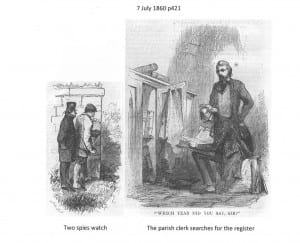At our next research seminar, on Thursday 28th Jan, Julia Podziewska (Sheffield Hallam) will talk to us on the topic of ‘Lost Property: Political Economy, Inheritance and Plot in Wilkie Collins’s The Woman in White and All the Year Round‘.
We are in room MB1012 (1st floor Minerva Building). There will be refreshments from 5pm and the paper will begin at 5.15pm. Please find Julia’s abstract below:
Abstract:
Inheritance plots proliferate in the mid-Victorian novel. Rare is the novel without a lost, hidden or destroyed last will and testament; a case of intestacy; a complicating codicil; or transfer by entail upset by the unexpected deaths of heirs apparent. Despite this plethora of post-mortem property plots, in recent decades it has been biological inheritance – the matter of heredity versus environment – that has held centre stage in scholarly debate (Gillian Beer, Darwin’s Plots, 1983; Jenny Bourne Taylor, In the Secret Theatre of Home, 1988). The inheritance of property has frequently been side-lined as little more than a plot device (Reed, Victorian Conventions, 1975); or its specificities have been occluded when it has been subsumed under the heading of women’s property issues more broadly. This has even been the case with the work of Wilkie Collins, whose canonised novels from the 1860s are each primarily structured by an inheritance plot.
This paper demonstrates that inheritance plots merit far more consideration. Reading The Woman in White in conjunction with All the Year Round, the second of Dickens’s magazines that Collins had written for, and the magazine in which the novel first appeared, serialised between Nov. 1859 and Aug. 1860, I gauge Collins’s preconceptions about his readers’ familiarity with inheritance law, show how his plots play with his readers’ awareness of property matters and argue that understanding the complexities of inheritance enables us to account for Collins’s famously dense, intricate plots. My paper further considers the appearance of life assurance as an alternative to inheritance, both as it features within the novel and as it appeared on the pages of the periodical press.
The paper closes with reference to the silence that surrounds inheritance and plot in general in Collins scholarship, advocating instead a critical practice that enables plot to be recognized as an historical form.

Recent Comments